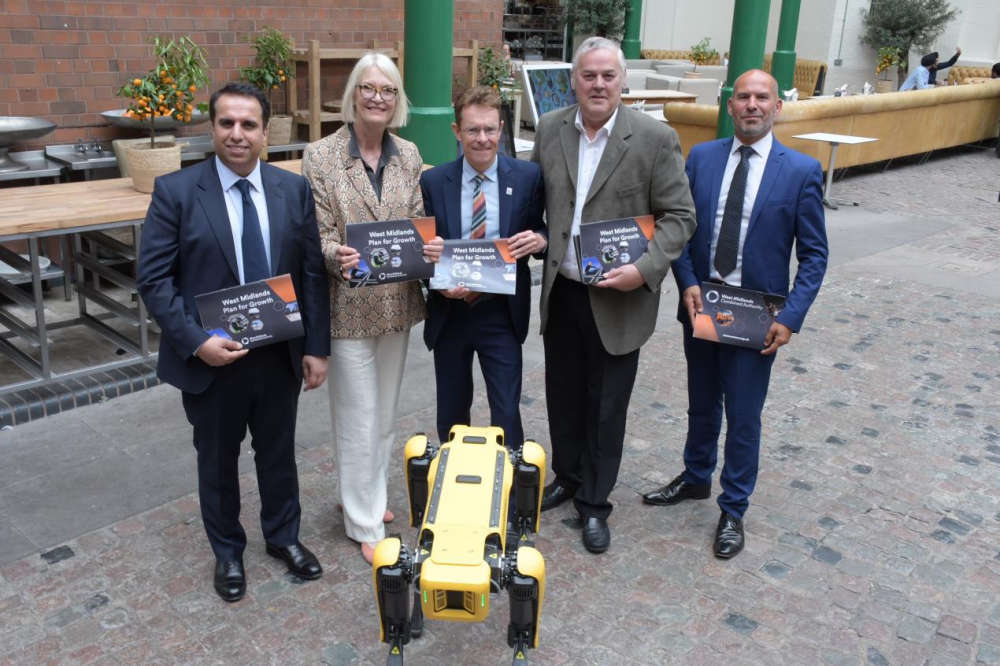
A plan to re-ignite the West Midlands economy and recapture its pre-pandemic success was set out last week as the true scale of the impact of Covid was made clear.
The West Midlands economy shrank by 11% in 2020 due, in part, to its large automotive sector and high number of exporting companies.
Despite having the highest level of Foreign Direct Investment outside London and a strong track record in getting people back into work, the regional economy was still 8% smaller at the end of last year than at the onset of Covid.
The figures are in stark contrast to the decade up to 2019, when the West Midlands was the fastest growing region outside London, breaking through the £100 billion economic output mark.
In response to the figures, business and political leaders gathered at the Light House in Wolverhampton to discuss their Plan for Growth aimed at bringing about a resurgent West Midlands that is both confident and prosperous.
The roadmap, which has been drawn up by leading private sector figures working with the West Midlands Combined Authority, local councils, universities and colleges, focuses action on igniting eight economic clusters where the region already has a competitive advantage and in which businesses are confident to invest.
It shows how, with the right interventions, growing clusters such as electric vehicle manufacture, health and medical technology and construction, can be supercharged to help grow the West Midlands economy by more than £3 billion, creating up to 45,000 new jobs. Andy Street, Mayor of the West Midlands and chair of the WMCA, said:
“The West Midlands was very much the engine room driving a thriving UK economy pre pandemic but there's no hiding the harsh impact Covid has had on us.
“Our natural strengths in exporting and manufacturing - particularly in automotive - have been hardest hit by recent challenges so it's no surprise we have more economic ground to make up than many others as we regain our momentum.
“That’s why the private and public sectors have come together to set out a clear path for strong, clean and inclusive growth.
“Our focus is on driving investment to generate high value jobs and quality opportunities for local people that build on our traditional strong suits whilst looking to the growth sectors of the future.
“It must be a joint effort because while the public sector can use and is using its powers and funding to help lay the foundations for growth - think transport infrastructure, housing, urban regeneration and skills training - it will be the private sector that follows on with much greater investment and really drives delivery. Together, we will ensure we bounce back as a region.”
The Plan flags the critical partnerships needed to secure a growing economy that is both environmentally cleaner and fairer to communities and highlights the crucial role of the private sector, working alongside public authorities, in creating the right conditions for investment and prosperity. Cllr Ian Brookfield, WMCA portfolio holder for economy and innovation and leader of City of Wolverhampton Council, added:
“Ongoing global supply chain frictions, a tight labour market, spiking energy costs and high inflation mean it’s never been more important for the West Midlands to support local people into high-quality jobs by capitalising on our strengths, in particular those economic clusters that can power a regional and national recovery.
“This Plan for Growth shows that by expanding those clusters, such as the development of low carbon modern methods of construction, and building a sustainable economy, we will be more diverse and resilient – and not so vulnerable to future shocks in one industry.
“With the private and public sectors working together to deliver this roadmap we can put the West Midlands economy back on an upward trajectory, eventually shrinking the gap between our region and London.”
The audience heard how the WMCA and its partners were already laying the foundations for future success by investing more than £2 billion in new transport, housing and skills schemes, using the UK Shared Prosperity Fund, CRSTS, Community Renewal Fund and other funding pots to drive growth and by securing new investment through an Innovation Accelerator. Some of the region’s most innovative companies operating in the eight priority clusters were also on hand at the event to showcase their cutting-edge products.
These included Coventry-based Skyfarer who are developing drones capable of delivering medical supplies and other items, WM5G which has a 5G enabled camera in a pill that can detect bowl cancer without the need for an invasive endoscopy and WMG which showcased a robotic dog to demonstrate its research into automated manufacturing systems.












Comments
Add a comment